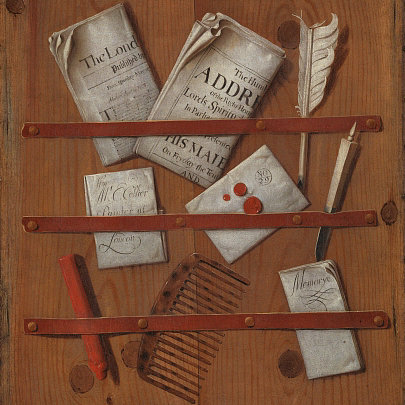 Webs of Information: Scribal News and News Cultures around 1700
Webs of Information: Scribal News and News Cultures around 1700
Michael Schaich
m.schaich@ghil.ac.ukScribal news is a rather neglected field in media and political history. Scholars interested in the transmission of news items in manuscript form have focussed primarily on the 16th century, the period before the invention of the newspaper, or at best the early decades of the 17th century. For later periods, when printed newspapers had established themselves as a vital means of communication there was seemingly no need to explore the topic further. By the turn of the 18th century at the latest, manuscript newsletters must surely have gone out of business, replaced by a more modern and efficient medium.
My project challenges this teleological narrative by focusing on the long afterlife of scribal news well into the 18th century. Based on handwritten newsletters that survive in archives and libraries in Britain and Germany, it reconstructs the world of scribal news and also explores the relationship between manuscript and printed forms of reporting about current developments. In particular, it zooms in on a small group of information professionals, mostly of Huguenot descent, who worked in London and supplied a number of German princely courts and city-states with up-to-date information on the political, economic, and cultural affairs of Britain and the British Empire more widely. In producing reports that were picked up by political elites impatient for the latest news and gossip, these men acted as foreign correspondents for a high-ranking readership and were in many cases eventually subsumed into the diplomatic service.
The project thus explores the hitherto neglected transnational dimension of early modern modes of communication, going beyond a narrow understanding of media history that focuses almost exclusively on developments within borders of states or empires. In addition, by following the paper trail that the reports left in the archives of German princes, it contributes to the growing body of research on the early modern information state. It reconstructs how administrations in premodern times acquired knowledge about the world around them and how they processed, stored, and used this information.
Related Publications
‘Information Professionals: Huguenot Diplomats in Later Stuart London and Their European Context’, in Vivienne Larminie (ed.), Huguenot Networks 1560–1780: The Interactions and Impact of a Protestant Minority in Europe, Politics and Culture in Europe, 1650–1750 (New York/London, 2018), 75–91
Related Events and Presentations
‘Scribal News and News Cultures in Late Stuart and Early Georgian Britain’, History of Parliament Trust, 18 Bloomsbury Square, and German Historical Institute London, 14 Dec. 2018
